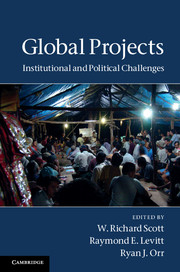Book contents
- Frontmatter
- Contents
- List of figures
- List of tables
- List of contributors
- Preface
- Introduction: studying global projects
- Part I Foundational themes
- Part II Institutional differences and global projects: empirical studies
- 4 Rules versus results: sources and resolution of institutional conflicts on Indian metro railway projects
- 5 Institutional exceptions on global projects: a process model
- 6 Local embeddedness of firms and strategies for dealing with uncertainty in global projects
- 7 Who needs to know what? Institutional knowledge and global projects
- Part III Political conflicts and global projects
- Part IV Governance strategies and structures
- References
- Index
7 - Who needs to know what? Institutional knowledge and global projects
Published online by Cambridge University Press: 05 June 2012
- Frontmatter
- Contents
- List of figures
- List of tables
- List of contributors
- Preface
- Introduction: studying global projects
- Part I Foundational themes
- Part II Institutional differences and global projects: empirical studies
- 4 Rules versus results: sources and resolution of institutional conflicts on Indian metro railway projects
- 5 Institutional exceptions on global projects: a process model
- 6 Local embeddedness of firms and strategies for dealing with uncertainty in global projects
- 7 Who needs to know what? Institutional knowledge and global projects
- Part III Political conflicts and global projects
- Part IV Governance strategies and structures
- References
- Index
Summary
Introduction
Projections of increased population growth (Sachs 2005), urbanization, and sorely needed civil and social infrastructure worldwide point to increased demand for global projects – even in a time of global economic downturn – and afford attractive opportunities for firms within the Architecture–Engineering–Construction (AEC) sector to expand internationally. According to Morgan Stanley's predictions, emerging market countries will spend US$22 trillion on infrastructure in the next ten years alone (Economist 2008). Many firms are responding to these opportunities and have enjoyed increasing revenues. For example, the revenues of the top 225 international contractors increased 18.5 percent from 2005 to 2006 for projects outside their home markets (Reina and Tulacz 2007).
As exciting as the projections and opportunities appear, international construction projects also involve many uncertainties and risks not found on domestic projects. All projects confront various technical and financial challenges and risks, but international constructions face another special set of problems. These projects involve diverse participants from differing backgrounds and cultures who work together in unfamiliar locations. Projects conducted in countries other than one's own also confront differences in rules and political systems, differences in norms and customs, differences in values and beliefs. We refer to these kinds of challenges as “institutional” differences. Scholars such as Zaheer (1995) label firms who lack knowledge of such differences as suffering from a “liability of foreignness” (Zaheer 1995). This liability of foreignness increases misunderstandings and escalates the risks and costs of doing business in new locations abroad (Flyvbjerg et al. 2003; Orr and Scott 2008; see Chapter 5).
- Type
- Chapter
- Information
- Global ProjectsInstitutional and Political Challenges, pp. 247 - 276Publisher: Cambridge University PressPrint publication year: 2011
- 4
- Cited by



